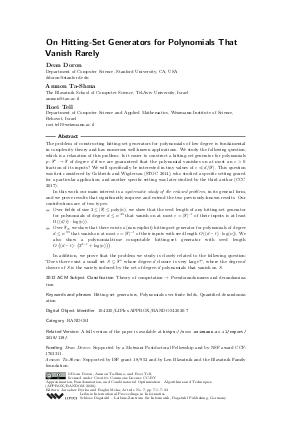@InProceedings{doron_et_al:LIPIcs.APPROX/RANDOM.2020.7,
author = {Doron, Dean and Ta-Shma, Amnon and Tell, Roei},
title = {{On Hitting-Set Generators for Polynomials That Vanish Rarely}},
booktitle = {Approximation, Randomization, and Combinatorial Optimization. Algorithms and Techniques (APPROX/RANDOM 2020)},
pages = {7:1--7:23},
series = {Leibniz International Proceedings in Informatics (LIPIcs)},
ISBN = {978-3-95977-164-1},
ISSN = {1868-8969},
year = {2020},
volume = {176},
editor = {Byrka, Jaros{\l}aw and Meka, Raghu},
publisher = {Schloss Dagstuhl -- Leibniz-Zentrum f{\"u}r Informatik},
address = {Dagstuhl, Germany},
URL = {https://drops.dagstuhl.de/entities/document/10.4230/LIPIcs.APPROX/RANDOM.2020.7},
URN = {urn:nbn:de:0030-drops-126109},
doi = {10.4230/LIPIcs.APPROX/RANDOM.2020.7},
annote = {Keywords: Hitting-set generators, Polynomials over finite fields, Quantified derandomization}
}

 Creative Commons Attribution 3.0 Unported license
Creative Commons Attribution 3.0 Unported license





































